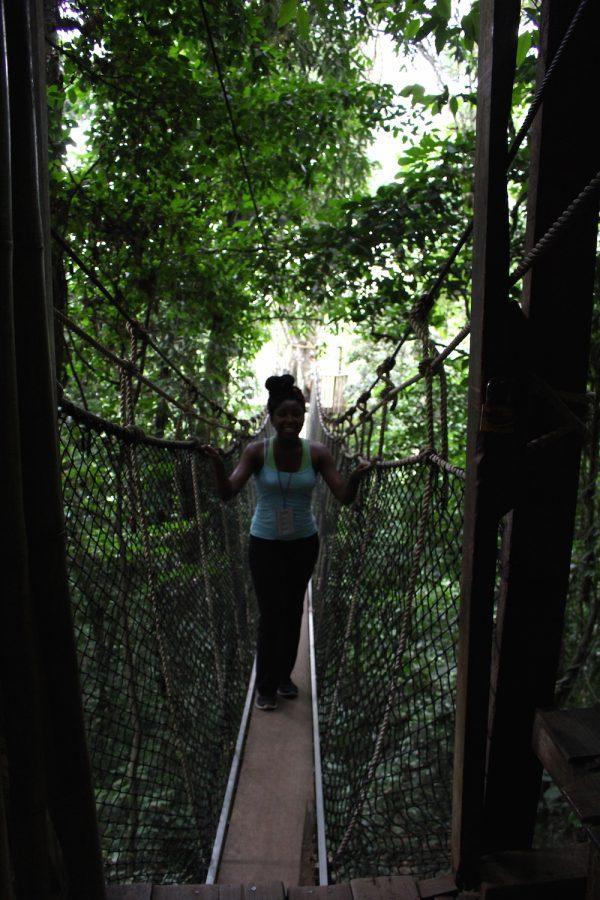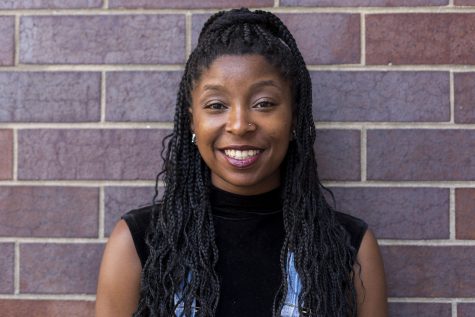Ghana: Learning to Love my Dark Skin
With so many cultural differences between NYC and Ghana, a study abroad trip to Accra can be greatly eye-opening.
October 12, 2016
Growing up, I always liked to tell the kids in my class that I was mixed. “I’m a quarter Guatemalan,” I’d say, letting them know that my grandma was born there. When my mom caught wind of what I had been telling my classmates, she decided it was time to sit me down and have a talk.
“Deja, you’re not mixed. You’re black,” she told me. Just to get the talk over with, I told her that I understood and that I would stop telling the kids in my class otherwise, but I never wanted to accept that I was just black.
Because of my mom’s occupation and her economic class, I lived and went to school in neighborhoods that, more often than not, were predominantly white. Constantly surrounded by people who looked nothing like me, I naturally was always comparing myself to my white classmates and neighbors, wishing that all of my features were all lighter. For a long time, I equated light skin with being beautiful.
Throughout high school I tried to look like women who I considered beautiful. My biggest wish was to look like Zooey Deschanel. The fair skin, piercing blue eyes, cute brunette bangs, all of it. However, after several very bad haircuts and years of relentlessly relaxing my hair, I realized that I would never be able to look like her. My skin was too dark, my hair too kinky, my eyes too brown.
While I would love to say that I left this mentality behind after leaving high school, that’s simply not the case. During my first few years at NYU I had slowly but surely accepted that this is what I look like and there was no changing that, no matter how much foundation I put on or how many relaxers I put in my hair. It wasn’t until my most recent study abroad trip to Accra, Ghana that I started feeling any different about the way that I looked.
Ghana has a way of stripping people down to their most basic elements — not only physically in the way that the constant heat convinced most to go makeup free for the duration of the trip, but also emotionally. I think it had something to do with very suddenly becoming uncomfortably aware of my own privilege. For six weeks I got really used to seeing myself with a bare face. I didn’t necessarily feel pretty but it was more out of convenience and as a precautionary measure to avoid suffering a breakout. But I didn’t feel out of place because many Ghanaian women also didn’t wear makeup. The billboards featured beautiful, dark-skinned male and female models advertising an array of different products ranging from perfume to candy. What’s more, for the first time in my life, I was not that token dark-skinned friend in the group. In Ghana, I was one of the majority.
Besides being surrounded by advertisements featuring beautiful, black models, I also met many locals, each of whom was uniquely beautiful. I was acquainted with men and women who owned local businesses who hoped to one day make it in the United States, who were local celebrities who wanted to serve as role models for those in their home communities, who were students with dreams of working at conglomerate media companies such as Disney, and all of them were just as dark as me, if not darker.
It’s not that I didn’t have black role models in the U.S. However, my immersion in a culture where I could see myself reflected in every person I walked past on the street became a defining moment not only in this trip, but in this chapter of my young adult life. I could see my hopes, dreams, worries, past heartaches and successes dancing in each stranger’s eyes as clearly as if I were staring at the all-consuming darkness of the back of my eyelids. It was a very powerful experience that I have never personally been able to achieve roaming the streets of New York, Virginia, or any of the other places that I have ever lived.
Although I am a bit ashamed that it took so long for me accept myself, I can honestly look back at my trip to Ghana as not only a great educational opportunity, but as a formative experience in which I learned a lot about myself. In Ghana, being surrounded by so many others who shared similar features to that of my own, I felt less like the odd one out. After many years of trying to convince myself that I could be beautiful even with my dark skin, it wasn’t until this trip that I actually believed it. Black is beautiful.
Email Dejarelle Gaines at [email protected].



























































































































































